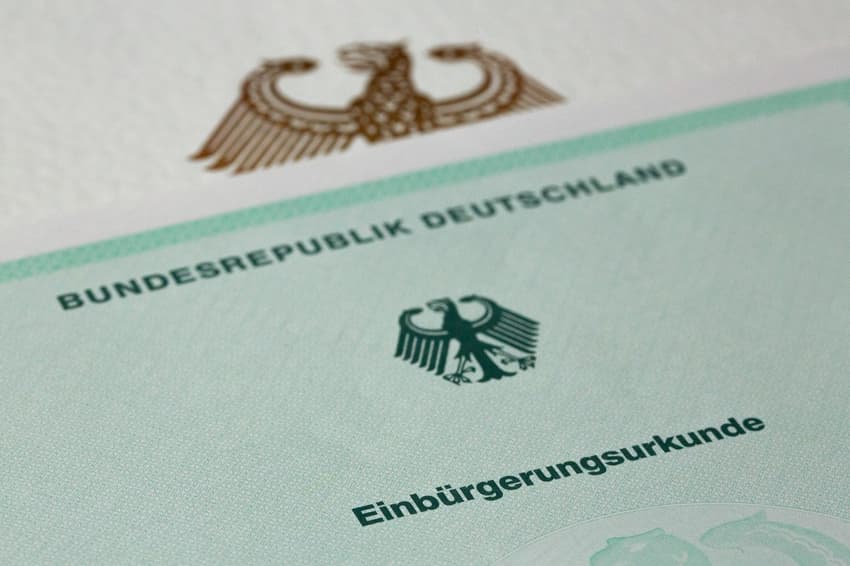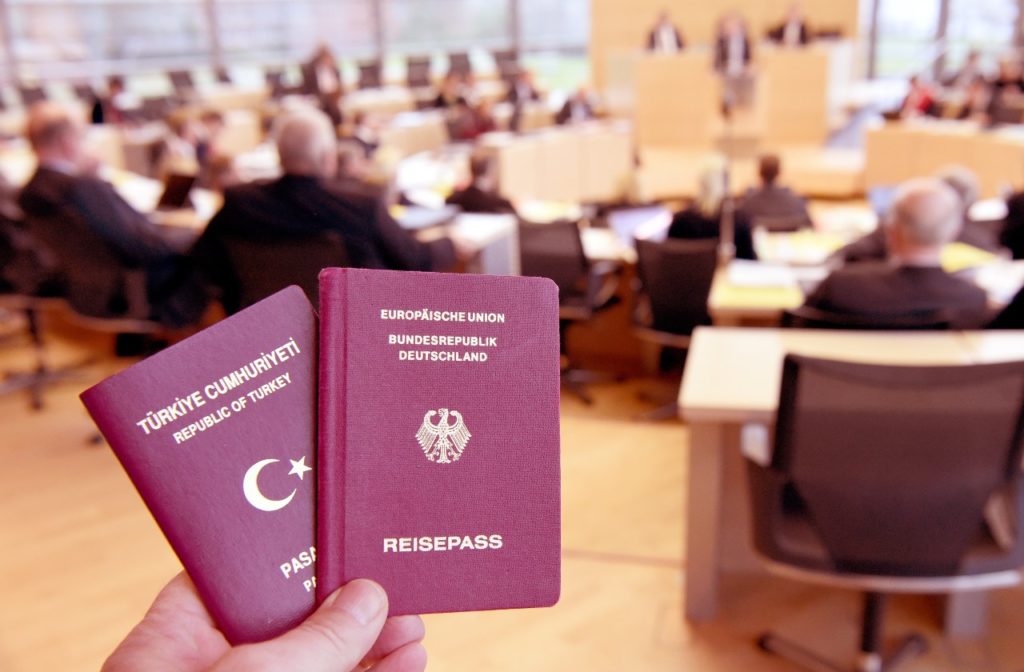'Finally': German government approves sweeping citizenship reforms

Ministers approved a new bill that will overhaul citizenship rules and permit dual nationality in Germany on Wednesday - marking a major step forward for one of the government's flagship reforms.
In a cabinet vote held on Wednesday afternoon, ministers waved through the reform plans, including proposals to slash the residence requirements for citizenship from eight years to five and allow the holding of multiple nationalities.
The draft law, which must still be voted on in the German parliament, also foresees simpler language requirements for over-67s and quicker routes to citizenship for the children of migrants.
Speaking at the Federal Press Conference in Berlin, Interior Minister Nancy Faeser (SPD) called the draft law "a major commitment to modern Germany."
"We're creating a modern naturalisation law that's worthy of our diverse society," she said. "And I can add: finally."
For several years, Faeser said, there had been endless debate over reforms to citizenship law that were too heavily influenced by resentments and exclusion.
READ ALSO: TIMELINE: When will Germany push through the new dual citizenship law?
Find out more about applying for German citizenship here
"These debates fell on the backs of people who have lived and worked in Germany for years... contributed to our affluence... but had no part in the debate," she explained.
With the overhaul of naturalisation rules, the government wants to honour the achievements and hard work of these migrants, the SPD politician explained.
In a key aspect of the reforms, the new citizenship law will open up routes for far more people in Germany to become dual nationals or hold multiple nationalities, including those from the country's large Turkish community.
Previously, maintaining previous nationalities after naturalisation was restricted primarily to EU or Swiss migrants.
Faeser said many of the foreigners living in Germany feel German but have put off applying for citizenship because they don't want to give up their previous passports.
These people "will no longer be forced to give part of their identity away", she said.
Another key aspect of the reform will see residence requirements cut to five years rather than eight, or - in circumstances where foreigners are especially well integrated - in three rather than six.

Interior Minister Nancy Faeser (SPD) introduces the citizenship reforms at a press conference in Berlin. Photo: picture alliance/dpa | Kay Nietfeld
The latter could apply to people with very advanced German language skills, to people with exceptional careers or those who take up volunteer work or social work in their communities, the Interior Minister explained.
Giving examples of each, she pointed to a Professor of Artificial Intelligence who could move German society forward, or a migrant who works for the voluntary fire service or the Red Cross.
The three-year route to citizenship would also be key to attracting the most skilled workers to Germany and encouraging them to build a life here, Faeser explained.
"There couldn't be a better incentive to integrate well," she said.
READ ALSO: Who qualifies for German citizenship under the new draft law?
Tougher rules
Though much of the bill constitutes a relaxation of rules for people who want to naturalise in Germany, some aspects of citizenship law will be tightened significantly.
In particular, prospective German citizens will have to prove they can support themselves and their families without relying on state benefits or other government financial support.
However, there will be some exceptions to this rule for certain groups of the population, including those from the Turkish guest worker generation and people with young children.
"Aside from that, we've toughened things up here," Faeser said.
The new restrictions were criticised by Memet Kilic, chair of the Federal Council for Integration.
READ ALSO: The vocabulary you need to understand the German citizenship process

A German and Turkish passport are held up in parliament in Kiel. Photo: picture alliance / Carsten Rehder/dpa | Carsten Rehder
In a statement released on Wednesday afternoon, Kilic slammed the changes as "unrealistic and more restrictive than before".
Since migrants do not always succeed in economic integration due to structural disadvantages, for example in finding a job, "the spiral of discrimination continues to turn towards unequal treatment in society", he added.
In another move to tighten up previous rules, migrants will have to show they can adhere to - and also believe in - German values of freedom and anti-discrimination before they can obtain German nationality.
That means there will be "zero tolerance" towards any crimes or civil misdemeanors that indicate racism, sexism or a rejection of democracy.
READ ALSO: UPDATED: The key points of Germany's draft law on dual citizenship
Instances like this - no matter how small - would bar people from citizenship, Faeser said.
Currently, around 11.8 million people live in Germany without a German passport, meaning they are unable to vote in federal or state elections.
In recent years, just 3 percent of people who had been living in the country for ten years or more submitted an application for citizenship.
This is far lower than neighbouring countries in Europe and "definitely not good for our democracy", Faeser said.
Comments (2)
See Also
In a cabinet vote held on Wednesday afternoon, ministers waved through the reform plans, including proposals to slash the residence requirements for citizenship from eight years to five and allow the holding of multiple nationalities.
The draft law, which must still be voted on in the German parliament, also foresees simpler language requirements for over-67s and quicker routes to citizenship for the children of migrants.
Speaking at the Federal Press Conference in Berlin, Interior Minister Nancy Faeser (SPD) called the draft law "a major commitment to modern Germany."
"We're creating a modern naturalisation law that's worthy of our diverse society," she said. "And I can add: finally."
For several years, Faeser said, there had been endless debate over reforms to citizenship law that were too heavily influenced by resentments and exclusion.
READ ALSO: TIMELINE: When will Germany push through the new dual citizenship law?
Find out more about applying for German citizenship here
"These debates fell on the backs of people who have lived and worked in Germany for years... contributed to our affluence... but had no part in the debate," she explained.
With the overhaul of naturalisation rules, the government wants to honour the achievements and hard work of these migrants, the SPD politician explained.
In a key aspect of the reforms, the new citizenship law will open up routes for far more people in Germany to become dual nationals or hold multiple nationalities, including those from the country's large Turkish community.
Previously, maintaining previous nationalities after naturalisation was restricted primarily to EU or Swiss migrants.
Faeser said many of the foreigners living in Germany feel German but have put off applying for citizenship because they don't want to give up their previous passports.
These people "will no longer be forced to give part of their identity away", she said.
Another key aspect of the reform will see residence requirements cut to five years rather than eight, or - in circumstances where foreigners are especially well integrated - in three rather than six.

The latter could apply to people with very advanced German language skills, to people with exceptional careers or those who take up volunteer work or social work in their communities, the Interior Minister explained.
Giving examples of each, she pointed to a Professor of Artificial Intelligence who could move German society forward, or a migrant who works for the voluntary fire service or the Red Cross.
The three-year route to citizenship would also be key to attracting the most skilled workers to Germany and encouraging them to build a life here, Faeser explained.
"There couldn't be a better incentive to integrate well," she said.
READ ALSO: Who qualifies for German citizenship under the new draft law?
Tougher rules
Though much of the bill constitutes a relaxation of rules for people who want to naturalise in Germany, some aspects of citizenship law will be tightened significantly.
In particular, prospective German citizens will have to prove they can support themselves and their families without relying on state benefits or other government financial support.
However, there will be some exceptions to this rule for certain groups of the population, including those from the Turkish guest worker generation and people with young children.
"Aside from that, we've toughened things up here," Faeser said.
The new restrictions were criticised by Memet Kilic, chair of the Federal Council for Integration.
READ ALSO: The vocabulary you need to understand the German citizenship process

In a statement released on Wednesday afternoon, Kilic slammed the changes as "unrealistic and more restrictive than before".
Since migrants do not always succeed in economic integration due to structural disadvantages, for example in finding a job, "the spiral of discrimination continues to turn towards unequal treatment in society", he added.
In another move to tighten up previous rules, migrants will have to show they can adhere to - and also believe in - German values of freedom and anti-discrimination before they can obtain German nationality.
That means there will be "zero tolerance" towards any crimes or civil misdemeanors that indicate racism, sexism or a rejection of democracy.
READ ALSO: UPDATED: The key points of Germany's draft law on dual citizenship
Instances like this - no matter how small - would bar people from citizenship, Faeser said.
Currently, around 11.8 million people live in Germany without a German passport, meaning they are unable to vote in federal or state elections.
In recent years, just 3 percent of people who had been living in the country for ten years or more submitted an application for citizenship.
This is far lower than neighbouring countries in Europe and "definitely not good for our democracy", Faeser said.
Join the conversation in our comments section below. Share your own views and experience and if you have a question or suggestion for our journalists then email us at [email protected].
Please keep comments civil, constructive and on topic – and make sure to read our terms of use before getting involved.
Please log in here to leave a comment.